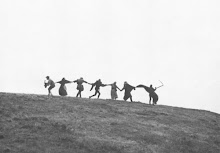 "Not naturally wicked but, on the contrary, as guileless as any man that ever lived. His great simplicity, however, together with his cowardice, made him the slave of his companions, and it was through them that he at first, out of ignorance, missed the better life and then was led on into lustful and cruel habits, which soon became second nature." — Dio Cassius
"Not naturally wicked but, on the contrary, as guileless as any man that ever lived. His great simplicity, however, together with his cowardice, made him the slave of his companions, and it was through them that he at first, out of ignorance, missed the better life and then was led on into lustful and cruel habits, which soon became second nature." — Dio CassiusCommodus was Emperor of Rome between the years 180 and 192 C.E. He was the son of Marcus Aurelius and, yes, he's the guy portrayed by Joachim Phoenix in Gladiator. Surprisingly, he was in real life almost as much of a bastard as Phoenix portrayed him to be.
His father was a sober, wise man who ruled during a difficult period in Rome's history. Commodus was not the first Roman emperor who inherited the title from his father, but he was the first to be "born to the purple", that is, born during his father's rule. Commodus was handsome, strong, athletic, but he was vain, impatient, cruel, and ultimately quite foolish. A shown in the movie, he really did like to fight gladiators in the Coliseum; he did it in the nude. He never lost, naturally, since the penalty for winning against the Emperor would be infinitely worse than being humbled by him in the ring. He was no coward: he also faced wild animals, incapable of faking submission — and he won. Publicly, he never killed his opponents, but privately he frequently did. He also charged the City of Rome a million sesterces for each appearance (to get a sense of the value, the average legionary was paid 1,200 sesterces per annum). His behaviour got even more eccentric: wounded soldiers would be placed in the arena for Commodus to kill with a sword. And people missing their feet due to accident or disease were taken to the arena where they were tethered together for Commodus to club to death while pretending they were giants.
There was more. He kept taking on new names, and when the number of his names reached 12 (Lucius Aelius Aurelius Commodus Augustus Herculeus Romanus Exsuperatorius Amazonius Invictus Felix Pius) he ordered that the 12 months of the year be renamed according to each of his names. So January became Lucius, etc. He also renamed Rome "Colonia Lucia Annia Commodiana", and renamed all kinds of institutions after himself too (for example, the Senate was renamed "Commodian Fortunate Senate", the legions were renamed "Commodianae", etc.).
It was all too much for his enemies, and the number of plots for his death increased. One group of conspirators, including his lover, Marcia, poisoned him on December 31, 192, but he vomited it all up again. They then sent a wrestler named Narcissus to Commodus in his bath to strangle him. This attempt succeeded. Upon his death the Senate immediate declared him a public enemy and changed the names of the months and the city and everything else back again.
Sources: Wikipedia, Roman Emperors




































